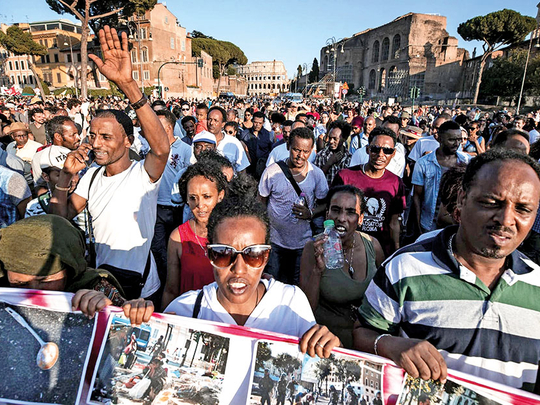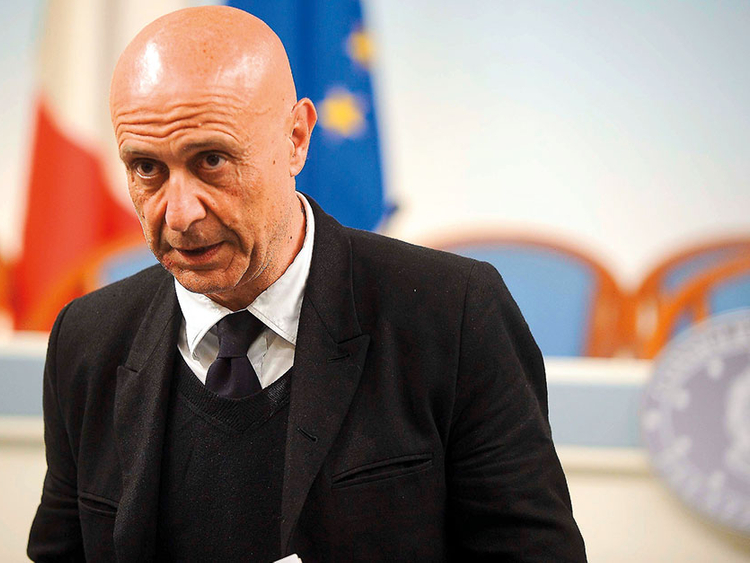
Rome: In his eight months in office, Marco Minniti, the austere Italian interior minister, has overseen a huge reduction in the number of African migrants and refugees reaching Italian shores from Libya. At the last count in August, the figure was 87 per cent down on the previous year.
A former communist with deep connections with Italian intelligence and the levers of the Italian state, Minniti is one of the most controversial politicians in Europe. His success in reducing migrant flows has won him praise and popularity on the right and notoriety on parts of the left.
There have been rumours of deals struck in the desert to induce tribes and militia to end the business of human trafficking.
It is claimed his methods are fragile, and leave unresolved the fate of the tens of thousands of refugees trapped in Libya in inhumane detention camps unable to reach Italy and unwilling to return to their country of origin on the other side of the Sahara desert.
Minniti offered a stout defence of his methods in an interview in Italy last week.
‘Unprecedented moment’
His country had faced an unprecedented moment in the history of migration, he said. In June, on the way to a meeting in the US, he stopped at Shannon airport to find his phone full of warnings that in the space of 24 hours there had been 12,500 arrivals in 25 vessels operating across the Mediterranean. He feared for Italian democracy.
“I had a problem. Should I continue my flight to Washington on the basis of showing the show must go on, or should I go back and by doing so dramatise everything?
“I thought I had to come back to be with operators overseeing the humanitarian rescue. We needed to transmit a message that we as the government had the capacity to react.”
The deeper worry for Minitti was that he had already set in train the reforms designed to stem the flow, but at that stage the fruits of his effort were invisible.
It was only in July and August that the picture transformed.
“The crucial point for me had been to go to Libya to find a solution. In Turkey with its migrant crisis there was a strong leader with which to work — perhaps too strong. In Libya it was the opposite.”
In many ways Minitti, faced by a fatally divided national state, was trying to create an alternative set of state institutions.
In February he signed a memorandum with the leader of the UN-recognised government, Fayez Al Serraj, introducing a new level of cooperation between the coastguard and the Italians, including the provision of four patrol vessels.
“If we look at results the Libyan coastguard has saved more than 13,000 people - figures that were absolutely unthinkable at the start of the year.
“But my conviction was the southern border of Libya is crucial for the southern border of Europe as a whole. So we have built a relationship with the tribes of southern Sahara. They are fundamental to the south, the guardians of the southern border, but they had been fighting one another and that meant the southern border was not controlled.
“On March 31 the tribes came to my office here in Rome. It was a very difficult discussion; 72 hours were needed to to try to find a solution and to build a peace that respected their independence.”
The deal with the southern tribesmen has made it easier to stem the flow of refugees from Chad, Mali and Niger.
On July 13, Minniti went a stage further, going to Libya to meet the mayors of the most important 14 cities that were interested.
“We discussed a pact. It was quite simple: engage yourself against the trafficking of human beings and we will help you to build an alternative economy. The problems at the moment is trafficking has been the only industry in Libya capable of producing an income revenue.”
He denied this process involved bribing militia.
“We have been quite transparent. We needed to help the communities to free themselves from the traffickers and to produce an alternative income. There is sustained help for the migrants in that city as well as hospitals and parks for children. The idea is to put resources on the table so that a good currency can defeat a bad currency. You needed to build a conversation with the whole society.
“When I met a sultan of the tribes he said: ‘You have to help me so that my children can lead a different life from trafficking.’ We have taken these projects to the European commission. These people want to change and it is the duty of the international community to help in this reconversion.”
‘Common values’
Minniti knows there is much more to do.
He wants the UN to regulate the Libyan detention camps, which is difficult due to the current lack of security.
More money is needed to help with voluntary repatriation of the refugees trapped in Libya. In the long term the EU will need to find billions to help the African economy.
In a few days he will publish an integration policy for Italy covering issues such as culture, language, routes into work for asylum seekers, the dispersal of reception centres and the governance, financing and transparency of mosques and imams.
“I am convinced that there is no equation between terrorism and migration,” Minniti says.
“That is an error of approach, but if we see what has happened in Europe there is a relationship between terrorism and a lack of integration, and I am convinced it is through integration and common values, we build a a security policy.”
— Guardian News & Media Ltd













